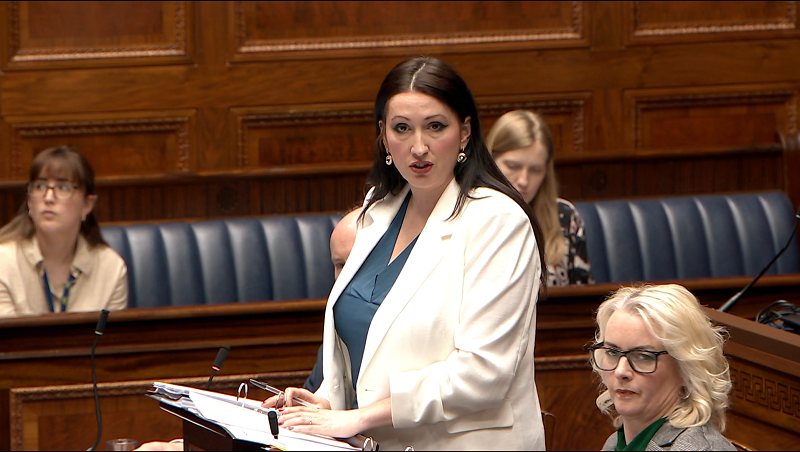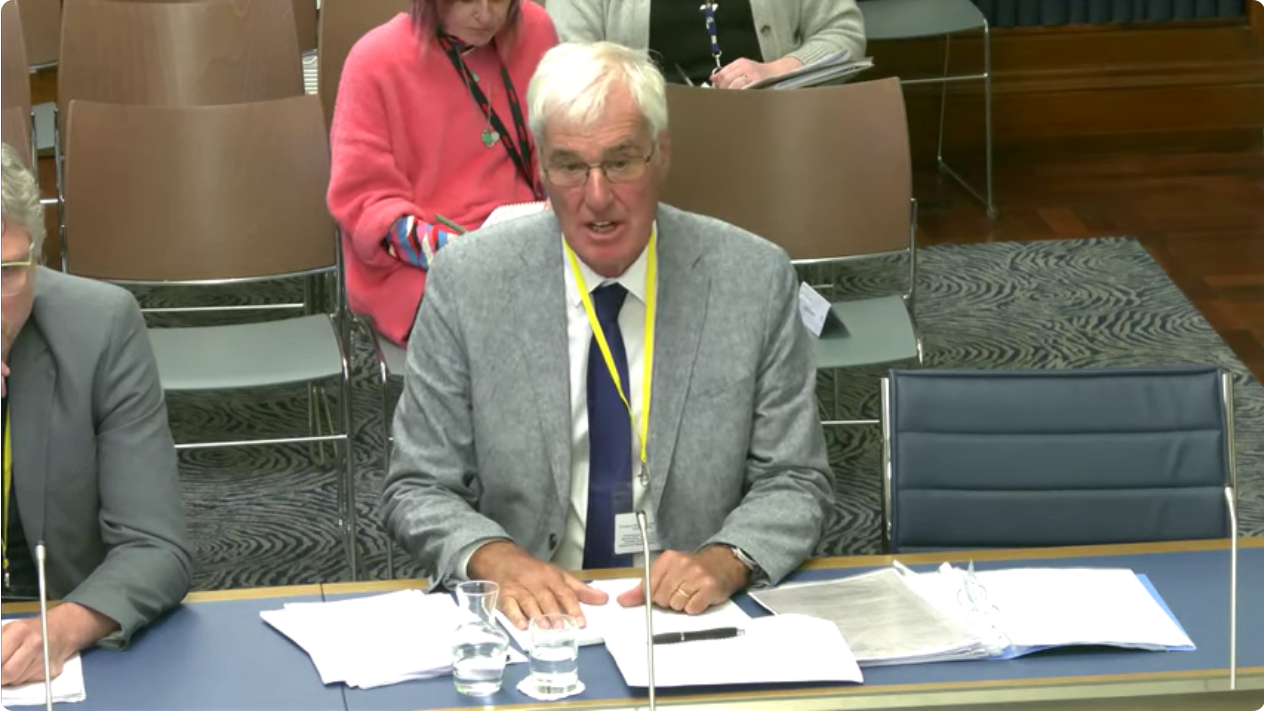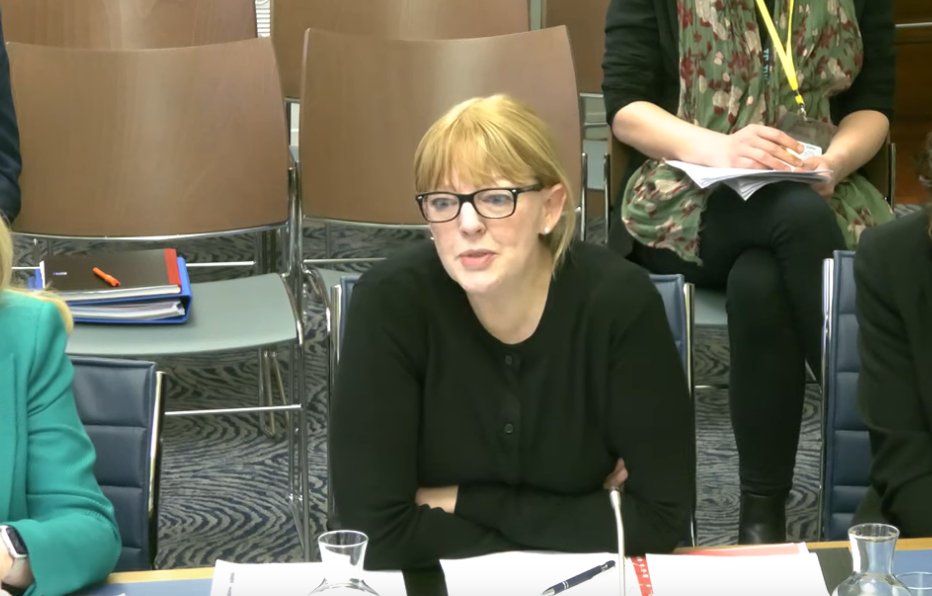Brexit & Beyond newsletter
22 April 2024
 Welcome to the 22 April 2024 Brexit & Beyond newsletter
Welcome to the 22 April 2024 Brexit & Beyond newsletter
Last week, ministers took questions in the Assembly chamber on applicability motions, and the EU’s proposed ban on dental amalgam. This proposed EU regulation was discussed in detail at the Windsor Framework Democratic Scrutiny Committee on Thursday, which heard evidence from the World Alliance for Mercury-Free Dentistry, and from officials at the Department of Health. The Committee for the Executive Office heard evidence from the Northern Ireland Human Rights Commission and the Equality Commission for Northern Ireland on Article 2 of the Windsor Framework. The European Commission has proposed a new EU-UK youth mobility arrangement. This week, the European Parliament will hold its last plenary session before the European elections on 6-9 June.
Question Time: applicability motions and EU regulation on mercury
At Question Time on 15 April, deputy First Minister Emma Little-Pengelly was asked about the Executive Office’s approach to applicability motions. Before the UK can agree with the EU in the Joint Committee that a new EU law should apply in NI, the Northern Ireland Assembly must indicate cross-community support for the new law to be added to the Windsor Framework by passing an ‘applicability motion’ - Read more on our website. Little-Pengelly stated, “A decision to jointly table an applicability motion for newly published EU acts will be considered on a case-by-case basis.”

Deputy First Minister Emma Little-Pengelly
The Executive Office has tabled an applicability motion for a new EU act on organic pet food. The deputy First Minister told MLAs, “In this case, we believe that applying the regulation would avoid any new regulatory barriers in the United Kingdom and North/South, which is why we have made the decision to jointly table that motion… If we do not table the applicability motion and indicate that we want the measure to be applied, and, if it is not applied, it will leave Northern Ireland as the only place in the United Kingdom where pet food will require 100% organic content before it can be labelled organic. It is a technical proposal, but it is one that ensures that we do not create regulatory barriers in the United Kingdom or North/South.” She went on to say, “We need to be careful with the timescales and to be fully informed…many of the issues will be technical and we will need to know quickly whether the proposals will create new regulatory barriers.”
The Minister of Health was asked by Eóin Tennyson about the EU’s proposed ban of dental amalgam. He said, “Surely, the Stormont Brake mechanism is a last resort and we should be seeking to engage as best we can to secure a derogation in advance.” Minister Swann stated, “The changes would significantly restrict dentists from replacing amalgam fillings, which would increase costs for patients and taxpayers and have a negative impact on the capacity of a service that is still struggling following the pandemic. My view remains that a phasing down, in line with the wider UK position, rather than a phasing out of amalgam is in the best interests of patients in Northern Ireland.”
Windsor Framework Democratic Scrutiny Committee
Last week, the Windsor Framework Democratic Scrutiny Committee heard evidence from the World Alliance for Mercury-Free Dentistry on a proposed replacement EU act, COM/2023/395 to amend Regulation (EU) 2017/852 on mercury, which would prohibit the use of dental amalgam from 1 January 2025. Florian Schulze, Administrative Vice President at the World Alliance for Mercury-Free Dentistry, told the Committee that in their view the proposed regulation is “not qualified” for pulling the Stormont Brake. He said, “On the contrary, society will benefit from it, especially because it will reduce health risk and environmental pollution.” He added that mercury is “so toxic that it has already been banned for all other uses…the EU has made its decision for good reasons.” He suggested that dentists “will always oppose a ban…it’s in their financial interests”. He said consumers should have access to less expensive and safe alternatives (e.g. glass ionomers and composite). Chief Dental Officer for the Alliance Graeme Munroe-Hall outlined to the committee how damaging exposure to dental mercury can be and the health consequences for dentists who use it. President of the Alliance Charles Brown said using mercury is “not modern dentistry” and stated, “Its actual cost is £70 per filling more than composite, when you add the environmental effects.” He added, “No consumer with any choice wants a mercury filling.”

Chief Dental Officer for the World Alliance for Mercury-Free Dentistry Graeme Munroe-Hall speaking to the Committee
Chair of the Democratic Scrutiny Committee Philip McGuigan asked about the availability, suitability and costs of substitutes if amalgam is completely phased out. Munroe-Hall said, “If you stop using amalgam tomorrow, there is enough composite available around the world and it's being made in more and more countries…there’s no availability problems.” He said composite’s effectiveness has increased over the years, and costs have decreased.
Joanne Bunting stated, “Everybody agrees it's preferable not to use amalgam”. However, she told the witnesses, “The issue of dispute is the timeframes for stopping use of amalgam…our difficultly is we have the worst oral health in these islands and…a crisis in national health dentistry…it’s not about the merits or otherwise of the use of amalgam”. She pointed out that the Department of Health says the proposed regulation will have a significant adverse impact. Schulze said, “We see this differently…we say that that it is feasible…I believe also for the consumer, it will be good: there's a large part of the population which will benefit from a phase out of dental amalgam, when alternatives become more accessible.”
Evidence from the Department of Health
Officials from the Department of Health also gave evidence on the proposed regulation to ban dental amalgam. They stated, “We are committed throughout the UK to phasing down the use of amalgam”, noting that that the UK is a co-signatory of the Minamata Convention. Officials explained the department’s concerns around the proposed timescale and the regulation’s impact, saying service capacity “has not yet recovered to pre-pandemic levels”. They highlighted the cost to both the taxpayer (estimated at £3.6 million) and to patients who would need white fillings (£2.9 million). An official stated, “The increased cost implication represents a 4% increase to the Department of Health's dental budget at a time of post-Covid pressure on the dental health system and significant pressure in public finances.” There is a process in place for the department to bid to Treasury for such cost pressures but there is no guarantee this would be secured. A mercury working group has been established with the Department for Agriculture, Environment and Rural Affairs (the regulation also falls under DAERA’s remit, as it is an environmental issue). The Department expects “significant impacts in January, if the law come into force.”
Philip McGuigan asked, “Are we…in this Committee potentially been asked to make a bad decision in terms of the environmental impact of the citizens we represent and potentially a bad decision on the impact of the health of the people that we represent, down to economics and the underfunding of dentistry?” An official responded by saying that that the previous witnesses from the World Alliance for Mercury-Free Dentistry had focused on the merits of the proposed regulation rather than the impacts and timescales. The department’s concerns relate to capacity, reliance on amalgam in Northern Ireland compared to other parts of the UK, and the state of oral health in NI. The official stated, “It is beyond question that the dental services are under pressure, but there are other factors at play.”
Notifications
Members of the Committee expressed dissatisfaction at the late notification by the Cabinet Office of two EU acts: the deadline for the Committee to carry out an inquiry, and the deadline for pulling the Stormont Brake, had passed. The Committee is writing to the Cabinet Office on this matter. The BBC reports on this development.
Committee for the Executive Office: Article 2
On 17 April, the Committee for the Executive Office heard evidence from the Northern Ireland Human Rights Commission and the Equality Commission for Northern Ireland, which make up the ‘Dedicated Mechanism’, which oversees the UK Government’s commitment in Article 2 of the Windsor Framework. Under Article 2, the UK Government committed to ensuring that there would be “no diminution of rights, safeguards or equality of opportunity” (as set out in the Good Friday Agreement) as a result of the UK leaving the EU. Geraldine McGahey, Chief Commissioner for the Equality Commission, informed the committee about forthcoming EU law which, in their view, falls within the scope of the ‘keeping pace’ commitment, including the EU directives on binding standards for equality bodies and the EU pay transparency directive. She said the committee has a “really important and vital scrutiny role” and emphasised, “Article 2 needs to be systemically embedded into the legislative and policy making processes of Northern Ireland departments.”

Alyson Kilpatrick, Chief Commissioner of the Northern Ireland Human Rights Commission
McGahey noted that the Stormont Brake does not apply to the ‘keeping pace’ commitment under Article 2. However, she stressed, “We still need to be vigilant, because there may be unintended consequences, which would impact on equality and human rights in Northern Ireland”, giving the example of the EU Accessibility Act. She said, “It is important therefore, that equality and human rights considerations are built into all key stages of the Stormont Brake mechanism and the Windsor Framework Democratic Scrutiny Committee should engage with the Commissions and other stakeholders to seek their views on these matters.”
Alyson Kilpatrick, Chief Commissioner of the Northern Ireland Human Rights Commission, set out key legal developments in relation to Article 2. She noted “various aspects [relating to the scope of Article 2] would require clarification by the courts”. Judgments are starting to come through: two of the key questions for the judicial interpretation of Article 2 regard who is protected, and the scope of rights covered. Kilpatrick told the Committee that the courts “have confirmed reassuringly key elements of our analysis from the outset.”
The Commissions highlighted several legal cases to the committee, including the SPUC Legal challenge to abortion services in NI, and the judicial review of the Northern Ireland Troubles (Legacy and Reconciliation) Act 2023. There is an ongoing challenge by the NI Human Rights Commission to the Illegal Migration Act. In their view, it breaches Article 2 because it reduces rights below the minimum standard required by the EU Asylum Directives. A judgement on this case is expected soon.
McGahey welcomed “the fact that the Windsor Framework sought to address the democratic deficit because we were always aware from the very outset that by virtue of leaving the EU, the ability for the Northern Ireland voice and the UK voice to be heard in terms of legislation was removed.” She stated, “However, the Stormont Brake does not apply to the Article 2 commitment because our equality legislation so far has been based on EU directives and that was recognized by the Government.” She said there is a gap already in equality and human rights between Northern Ireland and GB and they seek to close those gaps.
The Committee also heard from the Human Rights Consortium, which outlined its view on a number of pieces of UK Government legislation which it believes are in violation of Article 2.
European Commission announcement on youth mobility
The European Commission has proposed opening negotiations with the UK on an agreement to facilitate youth mobility. The Commission proposes that the new arrangements would cover 18-30 year-olds and that would enable a person to stay for up to 4 years in the destination country. The Commission states, “The envisaged agreement would provide for limited-in-time mobility, subject to the fulfilment of conditions to be checked before the mobility can take place. The conditions should also be met during the stay. It is not about conferring to young UK nationals the benefits of the fundamental freedom of movement enjoyed by EU citizens.” European Commission Vice-President Maroš Šefčovič said the aim is “to rebuild human bridges between young Europeans on both sides of the Channel.” The Commission's recommendation will be discussed in the Council, which has to agree before negotiations are commenced. The Guardian reports comments from a UK Government spokesperson that, “We are not introducing an EU-wide youth mobility scheme – free movement within the EU was ended and there are no plans to introduce it.”
Other news
- The Secretary of State for Northern Ireland has issued statutory guidance pursuant to regulation 4 of the Windsor Framework (Implementation) Regulations 2024. The regulations gives the UK Government powers to issue statutory guidance about the arrangements for the implementation of the Windsor Framework and confers powers on Government Ministers so they can do anything that a Northern Ireland Minister could do for the purpose of observing or implementing the relevant provisions of the Windsor Framework. The guidance will be kept under review and amended as needed.
- The NI Assembly Education Service has published a new animation video on Northern Ireland and Brexit.
- The Committee for Agriculture, Environment and Rural Affairs was briefed by the Department of Agriculture, Environment and Rural Affairs on the Emission Trading Scheme (ETS). The UK ETS replaces the UK’s participation in the EU’s ETS scheme. It was explained to the Committee that NI also continues to participate in the EU ETS under the terms of the Windsor Framework, to protect the operation of the single electricity market on the island of Ireland.
- The UK Government has laid a statutory instrument to revoke 73 pieces of Assimilated (Retained EU) Law in the Department for Environment, Food and Rural Affairs “because it is no longer operable, or suitable for purpose in the UK”.
- The Financial Times reports that the UK Government will not ‘turn on’ post-Brexit checks on EU goods for fear of border delays. Implementation of the new border controls has been postponed five times since 2021. On 30 April, documentary checks and physical and identity checks for medium-risk animal products, plant and plant products imported to Great Britain from the EU are to be introduced.
- The British-Irish Parliamentary Assembly met on 16 April. It heard about the potential opportunities for tourism in Northern Ireland, and the challenges posed by the introduction of the UK’s Electronic Travel Authorisation requirement. Joanne Stuart of Northern Ireland Tourism Alliance called the policy “disastrous” for cross-border travel.



